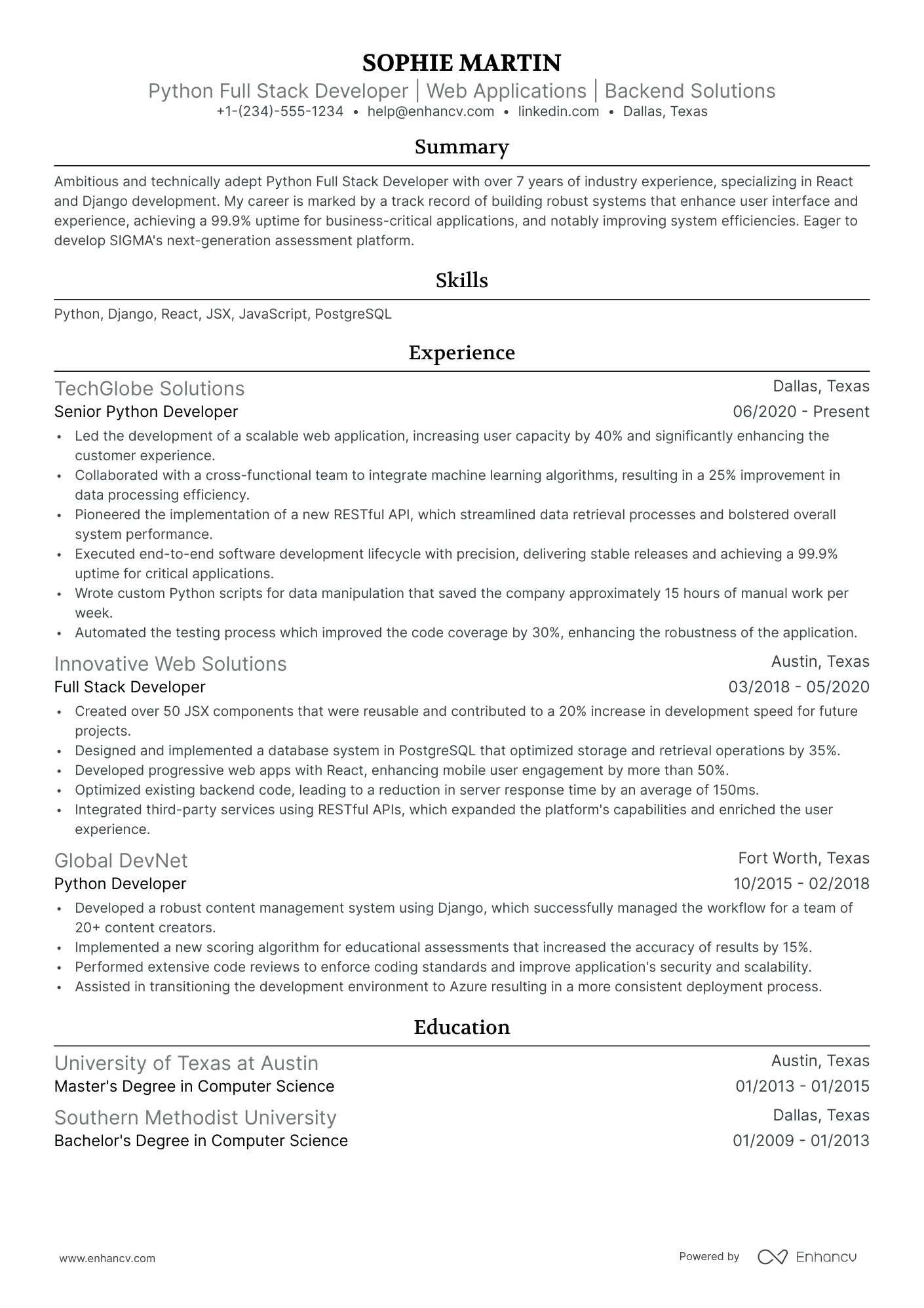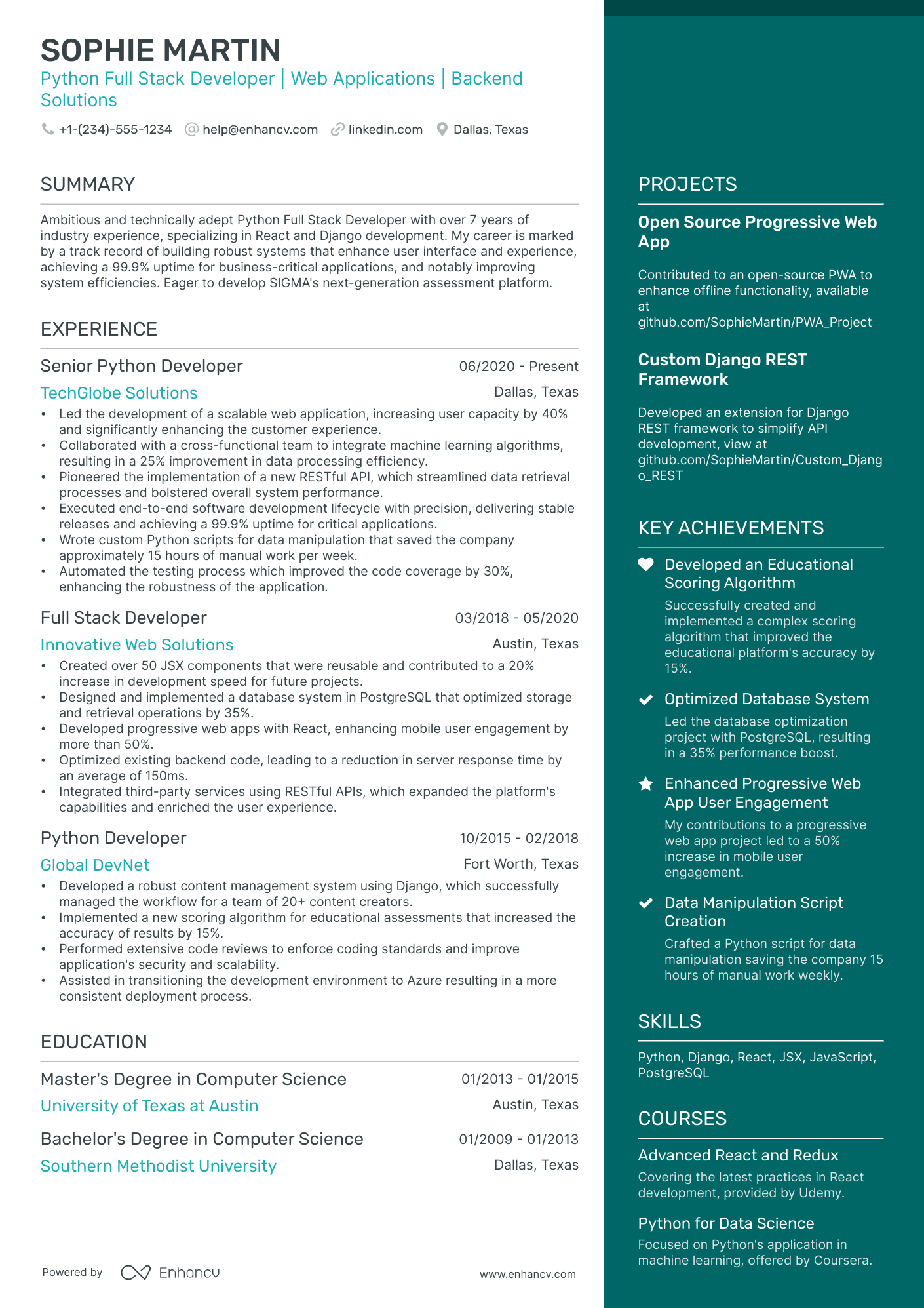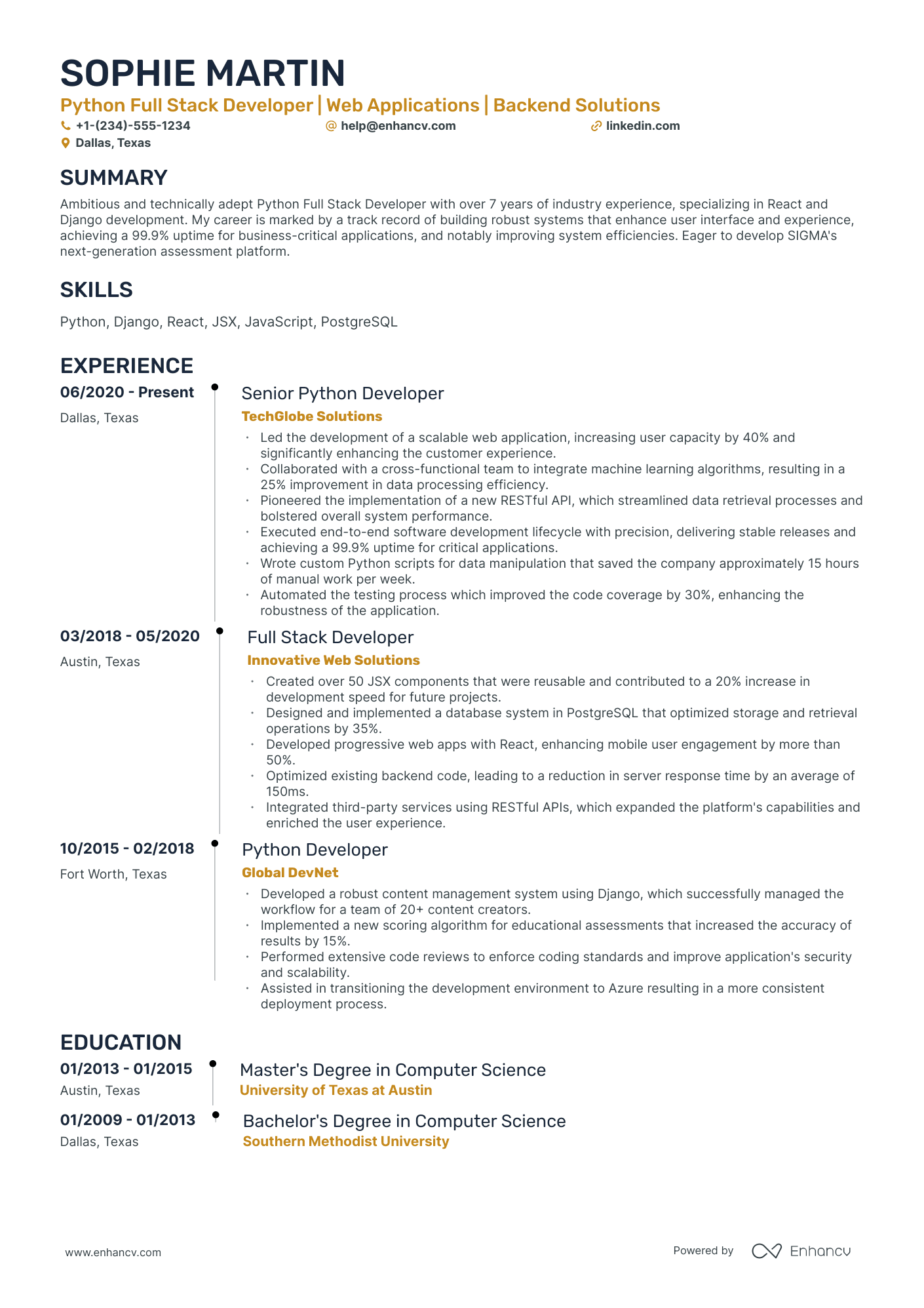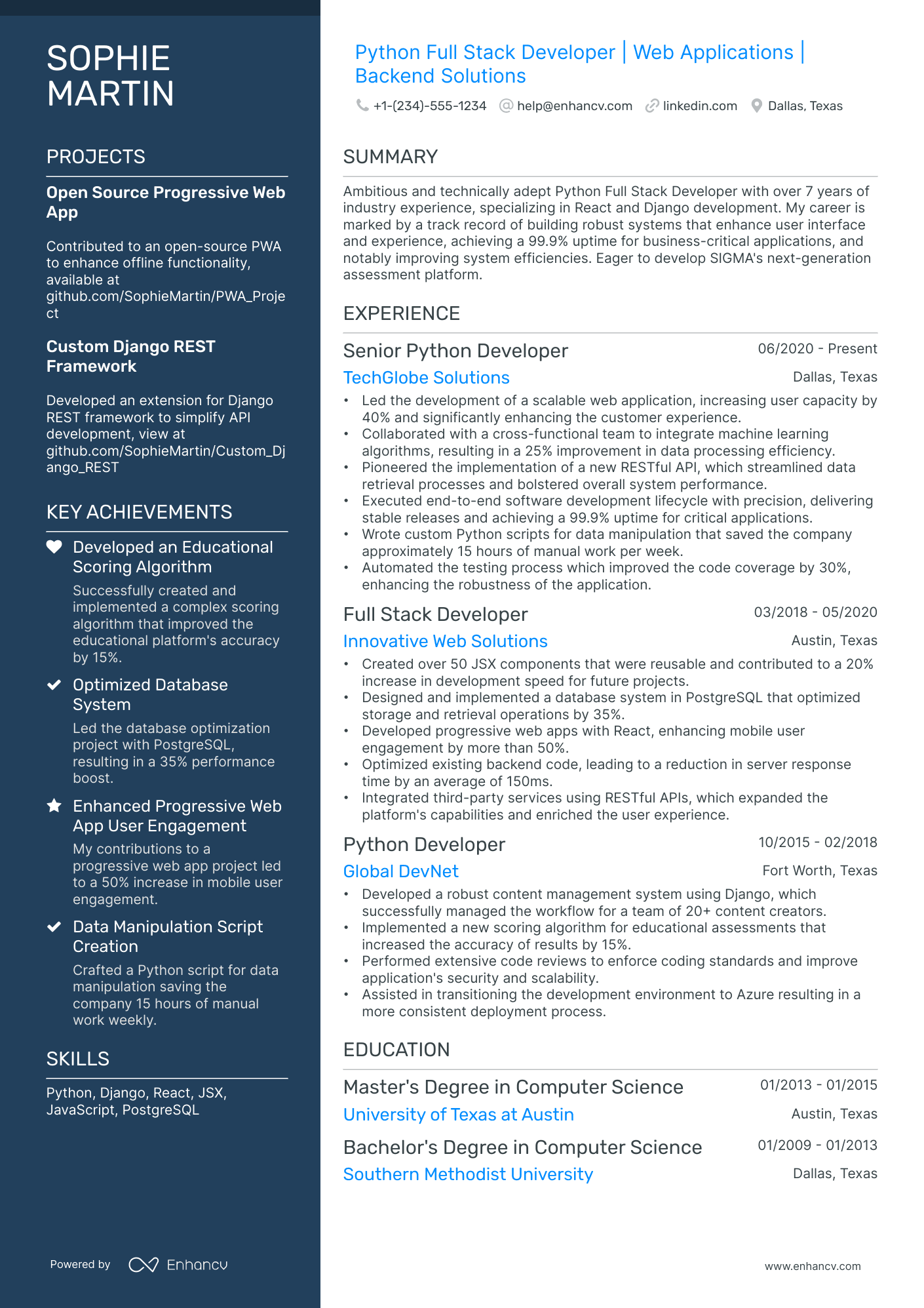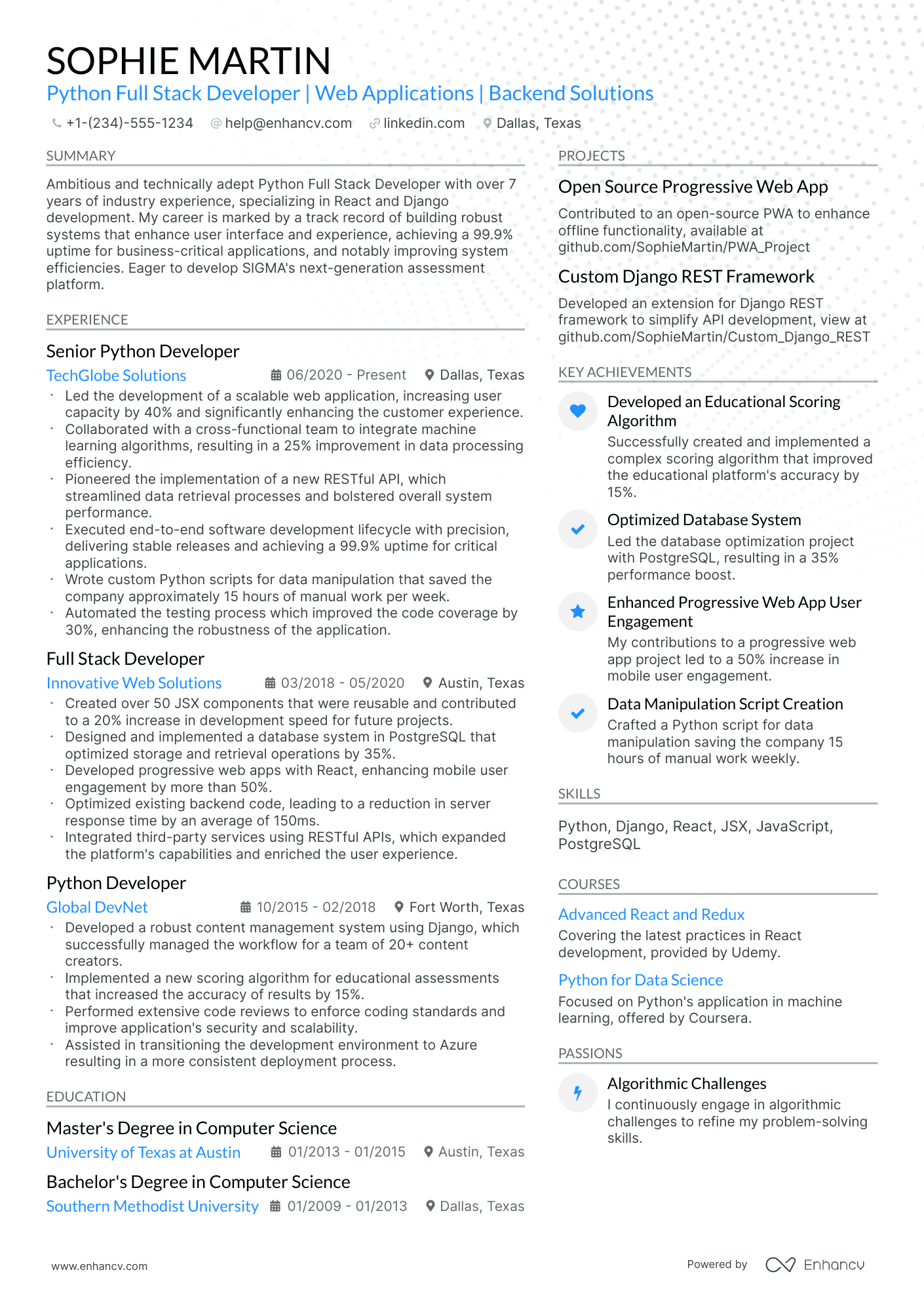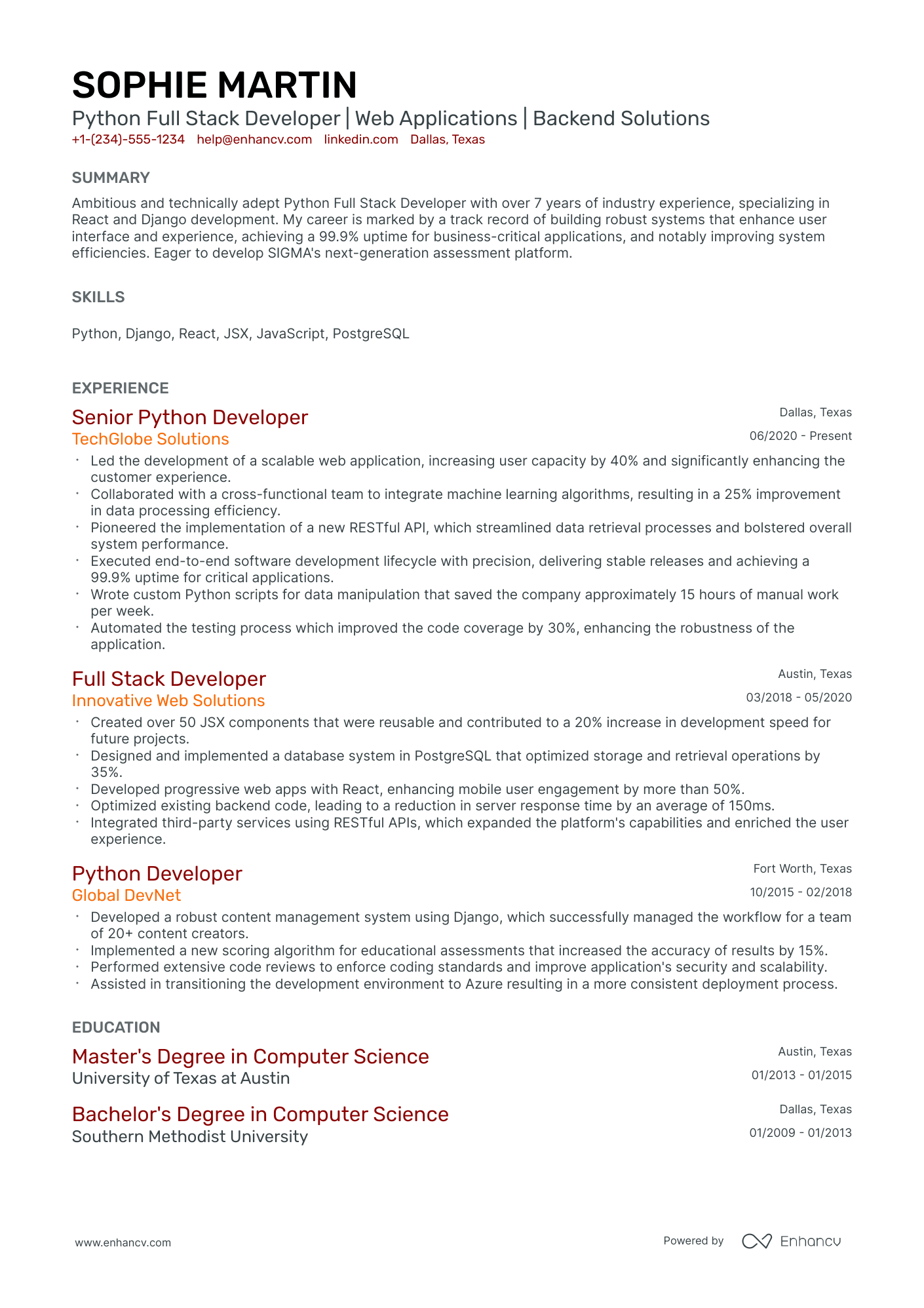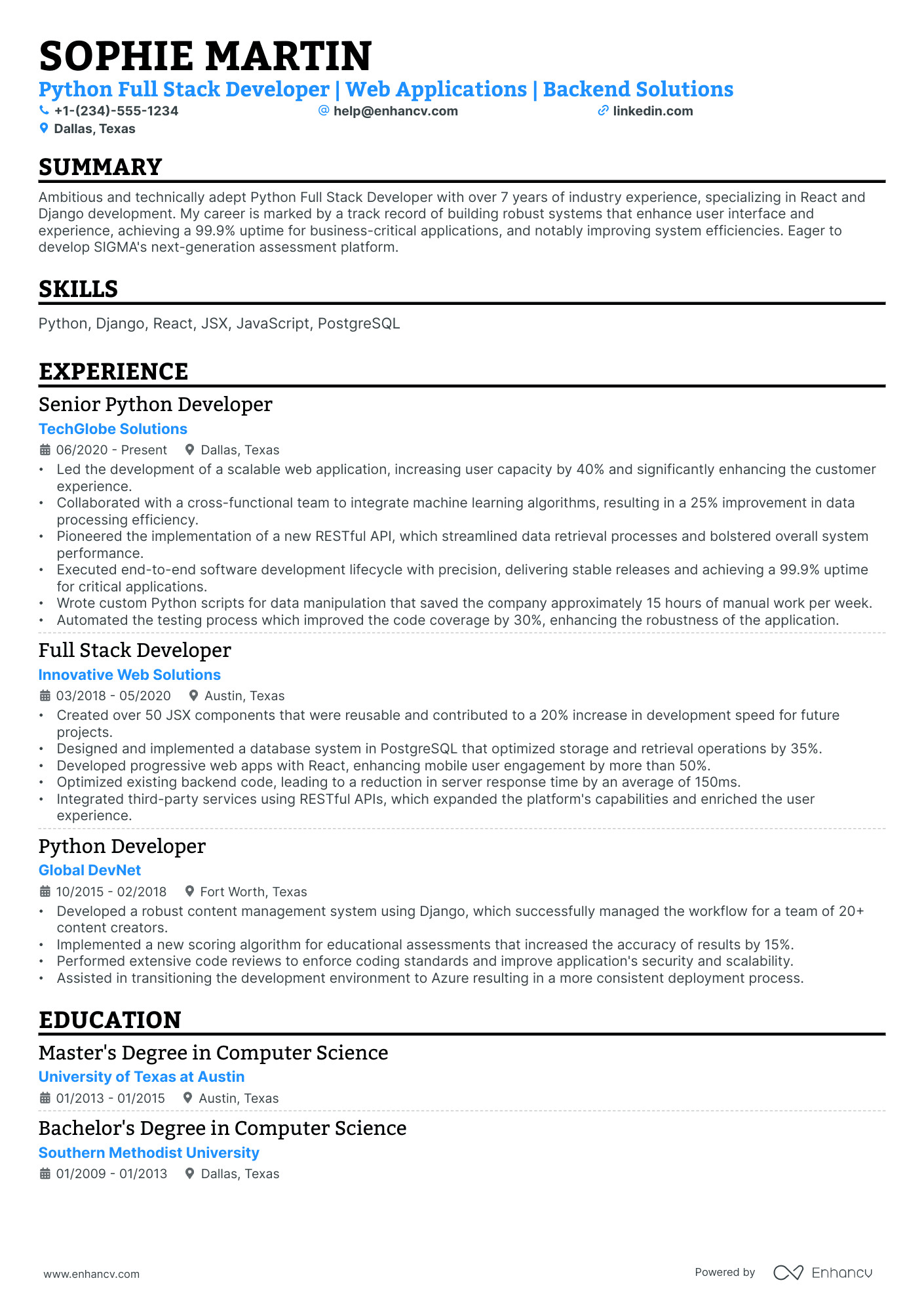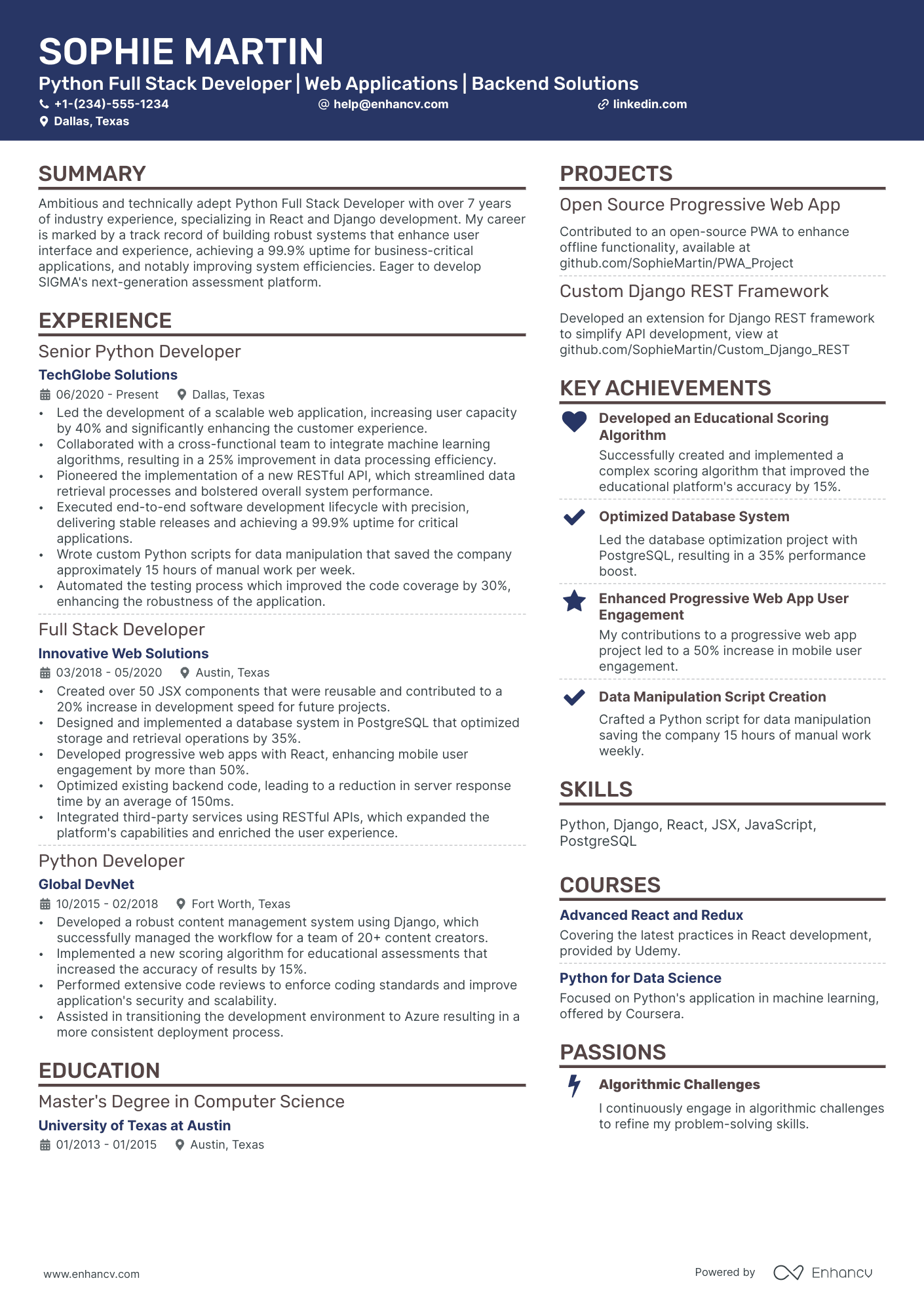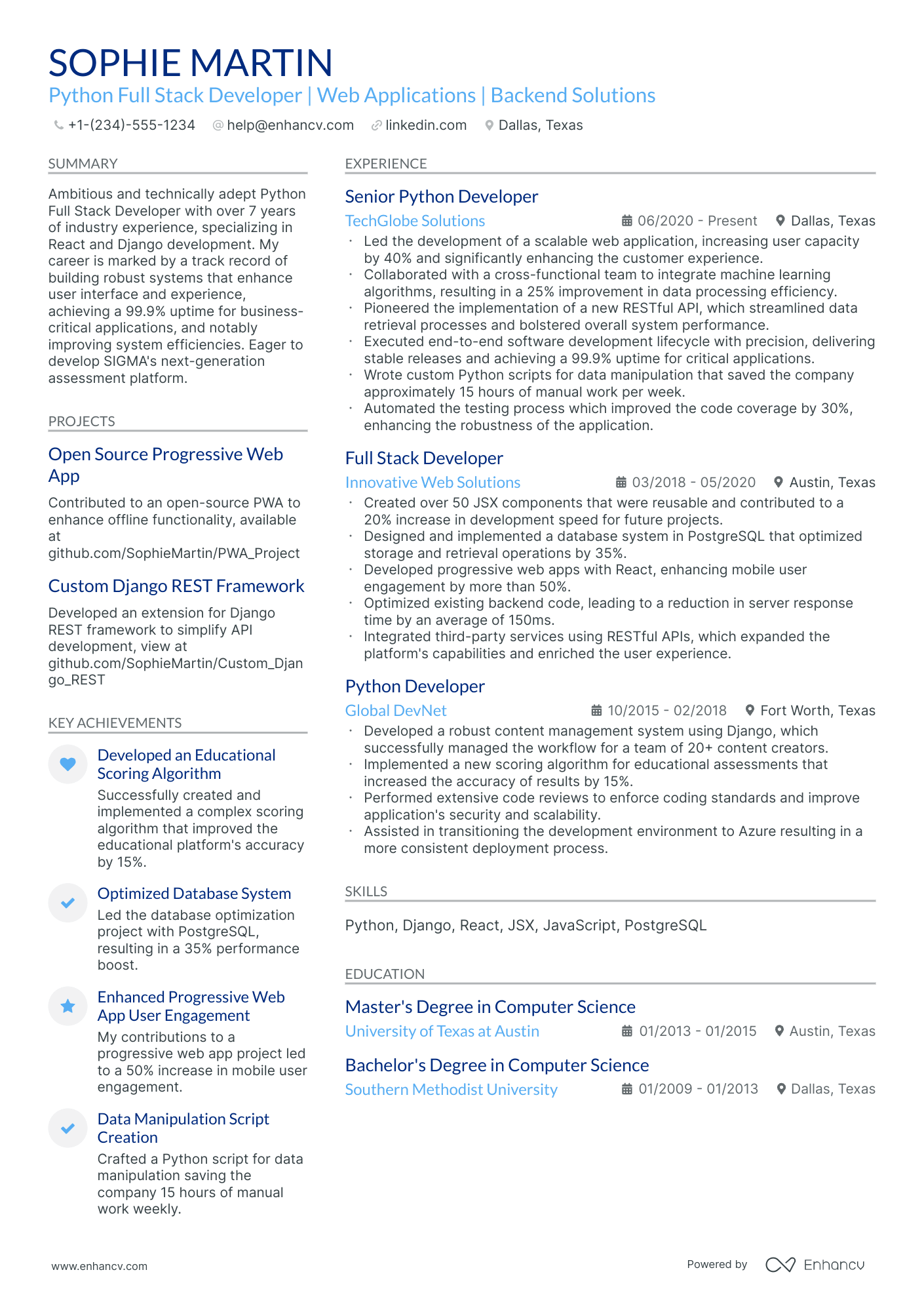As a Python full stack developer, articulating the breadth and depth of your technical skills to stand out can be a daunting resume challenge. Our guide offers tailored strategies and examples to effectively showcase your expertise and project experience, ensuring your resume commands attention in a competitive job market.
- Apply best practices from professional resumes to spotlight your application;
- Quantify your professional experience with achievements, career highlights, projects, and more;
- Write an eye-catching Python full stack developer resume top one-third with your header, summary/objective, and skills section;
- Fill in the gaps of your experience with extracurricular, education, and more vital resume sections.
We've selected, especially for you, some of our most relevant Python full stack developer resume guides. Getting you from thinking about your next career move to landing your dream job.
- System Analyst Resume Example
- Security Director Resume Example
- IT Support Manager Resume Example
- Cmm Programmer Resume Example
- QA Tester Resume Example
- Voip Network Engineer Resume Example
- Computer Support Specialist Resume Example
- Wireless Network Engineer Resume Example
- Computer Technician Resume Example
- Snowflake Developer Resume Example
Best practices for the look and feel of your Python full stack developer resume
Before you even start writing your Python full stack developer resume, first you need to consider its layout and format.
What's important to keep in mind is:
- The reverse-chronological resume is the most widely used format to present your experience, starting with your latest job.
- Your Python full stack developer resume header needs to include your correct, professional contact details. If you happen to have a professional portfolio or an updated LinkedIn profile, include a link to it.
- Ensure your resume is no longer than two pages - you don't have to include irelevant experience on your resume just to make it look longer.
- Unless specified otherwise, submit your resume in the most popular format, the PDF one, as this will ensure your Python full stack developer resume isn't altered.
Different markets have specific resume styles – a Canadian resume, for instance, may require a different approach.
Upload & Check Your Resume
Drop your resume here or choose a file. PDF & DOCX only. Max 2MB file size.
PRO TIP
If you're in the process of obtaining your certificate or degree, list the expected date you're supposed to graduate or be certified.
The key to your Python full stack developer job-winning resume - present your expertise with these sections:
- A header to make your resume more scannable
- Snapshot of who you are as a professional with your resume soft skills, achievements, and summary or objective
- Job advert keywords in the skills section of your resume
- Resume experience quantifying your past job successes with metrics
- A relevant education, certification, and technical sills section to provide background to your technological/software capabilities
What recruiters want to see on your resume:
- Proficiency in Python frameworks (like Django, Flask) and front-end technologies (such as HTML, CSS, JavaScript, and modern libraries like React or Angular).
- Experience with database management and ORM tools, including SQL databases (such as PostgreSQL, MySQL) and NoSQL databases (like MongoDB).
- Familiarity with RESTful API design and development, and web services integration.
- Knowledge of version control systems (such as Git) and deployment strategies for web applications (including containerization with Docker, Kubernetes).
- Demonstrable experience with test-driven development (TDD) and continuous integration/continuous deployment (CI/CD) workflows.
Experts' advice on writing your Python full stack developer resume experience
While the excitement and motivation for writing your Python full stack developer resume was present in the first hour (or so), you now find yourself staring at the blank page.
The resume experience section is the one that allows you to make a memorable impression by matching job requirement with your past jobs and accomplishments.
To help you write this resume section, here are four mistakes you need to avoid:
- Listing every job you have had so far, including the irrelevant ones. Before that, consider each of your past roles based on relevancy to the role. It may be the case that the job you had 15 years ago may have taught you invaluable skills that are appropriate for the role;
- Including irrelevant work experience items. Those are past jobs that aren't linked with the role you're applying for (or so they seem). Consider how your past jobs will serve your professional presentation: will they be filling in a gap in your work history, or just taking up space?
- Focusing on responsibilities instead of accomplishments. Your Python full stack developer resume shouldn't just be telling recruiters what you did in the past - as it's most often the case that candidates have had similar responsibilities. But, rather, the experience section should showcase the success you've attained in each past role, thanks to your unique skill set;
- Consider listing just your professional experience. Any role you've had in the past - e.g. volunteering, internships, etc. - can make it into your Python full stack developer resume experience section. Make sure to include it alongside numbers and results.
Two more things you need to remember about your resume experience section.
The first are keywords. Or those specific job requirements that are crucial for the role . Ensure you've integrated them across your experience section to get sorted closer to the ideal candidate profile by the Applicant Tracker System (ATS).
The second are action verbs. Each of your experience bullets should start with a strong action verb, followed by your specific skill and your on the job achievements. Follow this formula to hint to recruiters what your unique value as a professional is.
Still with us? In the next section, we will show you how industry-leading professionals have avoided the four most common mistakes, while integrating keywords and action verbs in their experience section.
- Spearheaded the development of a scalable e-commerce platform using Python, Django, and React, improving site performance by 35%.
- Designed and implemented RESTful APIs for cross-platform services, resulting in a 25% reduction in latency for mobile app users.
- Integrated third-party services such as Stripe for payment processing and AWS for cloud infrastructure, enhancing system reliability and user satisfaction.
- Developed and maintained a feature-rich internal tool for automating business processes using Flask and Vue.js, boosting operational efficiency by 20%.
- Collaborated with cross-functional teams to gather requirements and translate business needs into robust technical solutions.
- Implemented continuous integration/continuous deployment (CI/CD) pipelines reducing the deployment cycle time by half.
- Led a team of developers in creating a Python-based data analytics platform with a React frontend that provided actionable insights to marketing teams.
- Architected a real-time chat application using WebSockets, which increased user engagement by over 40%.
- Conducted thorough code reviews and pair programming sessions to maintain high code quality standards and mentor junior developers.
- Implemented a custom content management system (CMS) for dynamic website generation which reduced the content update time by 60%.
- Optimized backend processes and database queries in MySQL resulting in a 30% improvement in application response times.
- Led the integration of OAuth2 for secure API authentication, thus tightening the security framework of web services.
- Designed and executed a migration strategy for legacy code to modern Python frameworks, resulting in enhanced scalability and easier maintainability.
- Developed a series of microservices using Flask to break down a monolithic application into manageable, isolated components.
- Automated repetitive tasks which saved approximately 15 hours of manual work per week for the development team.
- Crafted a business intelligence tool with Python's Pandas library, allowing for comprehensive data analysis and visualization that drove conversion rates up by 22%.
- Integrated the platform with existing ERP systems, thus providing seamless data flow and improved inventory management.
- Orchestrated Docker containerization which enhanced the app's portability and reduced environment setup times for new developers significantly.
- Built and optimized a multi-tenant SAAS application using Python and Angular, supporting over 10,000 active users.
- Created an AI chatbot for customer support, reducing average resolution time by 50% and improving user experience.
- Proactively identified bottlenecks in the application and refactored code to improve modularity and readability.
- Developed a recommendation engine using machine learning algorithms in Python that increased cross-sell opportunities by 18%.
- Facilitated the implementation of responsive web design principles, which led to a 25% increase in mobile device engagement.
- Established effective unit and integration testing practices that reduced post-deployment bugs by 40%.
- Created a document management system with Python and JavaScript that streamlined the processing of over 1 million documents annually.
- Adopted an Agile development methodology which increased the team's delivery speed and responsiveness to change by 35%.
- Developed a series of automation scripts for the QA team, which decreased manual testing time by 75%.
- Implemented complex reports and data visualizations using Python libraries like Matplotlib and Seaborn leading to enhanced decision-making processes by senior management.
- Took charge of the full-stack development of a project management tool which increased internal operational efficiency by 30%.
- Overhauled front-end user interfaces with modern JavaScript frameworks such as AngularJS, providing a more intuitive and engaging user experience.
Quantifying impact on your resume
- Include the number of end-to-end projects you've developed to demonstrate the depth of your experience.
- List the percentage increase in application performance or load times your optimizations have achieved.
- Mention the exact number of users or transactions your applications have successfully supported.
- Detail the amount of money saved through efficient code refactoring or the introduction of new technologies.
- Specify conversion rate improvements achieved through iterations of user interface design.
- State the number of bugs or issues you've resolved in a given timeframe to showcase problem-solving skills.
- Quantify the size of databases you've managed or migrated, including the number of records.
- Highlight the number of team members you've led or mentored to feature leadership and teamwork skills.
Action verbs for your Python full stack developer resume
Remember these four tips when writing your Python full stack developer resume with no experience
You've done the work - auditing the job requirements for keywords and have a pretty good idea of the skill set the ideal candidate must possess.
Yet, your professional experience amounts to a summer internship .
Even if you have limited or no professional expertise that matches the role you're applying for, you can use the resume experience section to:
- List extracurricular activities that are relevant to the job requirements. Let's say you were editor-in-chief of your college newspaper or part of the engineering society. Both activities have taught you invaluable, transferrable skills (e.g. communication or leadership) that can be crucial for the job;
- Substitute jobs with volunteer experience. Participating in charity projects has probably helped you develop an array of soft skills (e.g. meeting deadlines and interpersonal communications). On the other hand, volunteering shows potential employers more about you: who you are and what are the causes you care about;
- Align job applications with your projects. Even your final-year thesis work could be seen as relevant experience, if it's in the same industry as the job you're applying for. Ensure you've listed the key skills your project has taught you, alongside tangible outcomes or your project success;
- Shift the focus to your transferrable skills. We've said it before, but recruiters will assess your profile upon both job requirements and the skills you possess. Consider what your current experience - both academic and life - has taught you and how you've been able to develop your talents.
Recommended reads:
PRO TIP
List all your relevant higher education degrees within your resume in reverse chronological order (starting with the latest). There are cases when your PhD in a particular field could help you stand apart from other candidates.
The right balance between hard skills and soft skills for your Python full stack developer resume
Wondering what the perfect Python full stack developer resume looks like? The candidate's profile meets job requirements by balancing both hard skills and soft skills across their resume.
- Hard skills are all the technologies you're apt at using . Prove you have the right technical background by listing key industry hardware/software in your Python full stack developer resume skills section and noteworthy certifications.
- Soft skills are both your personal, mindset, communication, analytical, and problem-solving talents . Use your Python full stack developer resume achievements section to show how you've used a particular soft skill to reach a tangible outcome.
When writing about your unique skill set, always make sure to refer back to the job advert to see what are the key requirements. This ensures you've tailored your resume so that it matches closer to what the ideal candidate profile is.
Top skills for your Python full stack developer resume:
Python
Django
Flask
JavaScript
React
HTML
CSS
SQL
RESTful APIs
Git
Problem-solving
Communication
Teamwork
Time management
Adaptability
Attention to detail
Critical thinking
Creativity
Empathy
Self-motivation
PRO TIP
Bold the names of educational institutions and certifying bodies for emphasis.
How to include your education and certifications on your resume
We're taking you back to your college days with this part of our guide, but including your relevant higher education is quite important for your resume.
Your degree shows recruiters your dedication to the industry, your recent and relevant know-how, and some form of experience in the field.
Your Python full stack developer resume education should:
- Include your applicable degrees, college (-s) you've graduated from, as well as start and end dates of your higher education;
- Skip your high school diploma. If you still haven't graduated with your degree, list that your higher education isongoing;
- Feature any postgraduate diplomas in your resume header or summary - this is the perfect space to spotlight your relevant MBA degree;
- Showcase any relevant coursework, if you happen to have less professional experience and think this would support your case in being the best candidate for the role.
As far as your job-specific certificates are concerned - choose up to several of the most recent ones that match the job profile, and include them in a dedicated section.
We've saved you some time by selecting the most prominent industry certificates below.
The top 5 certifications for your Python full stack developer resume:
- Python Programming Certification (PPC) - Python Institute
- Certified Professional in Python Programming (PCPP) - Python Institute
- Microsoft Certified: Azure Developer Associate (AZ-204) - Microsoft
- Amazon Web Services (AWS) Certified Developer – Associate - Amazon Web Services
- Professional Scrum Developer (PSD) - Scrum.org
PRO TIP
Showcase any ongoing or recent educational efforts to stay updated in your field.
Recommended reads:
Adding a summary or objective to your Python full stack developer resume
One of the most crucial elements of your professional presentation is your resume's top one-third. This most often includes:
- Either a resume summary - your career highlights at a glance. Select the summary if you have plenty of relevant experience (and achievements), you'd like recruiters to remember about your application.
- Or, a resume objective - to showcase your determination for growth. The perfect choice for candidates with less experience, who are looking to grow their career in the field.
If you want to go above and beyond with your Python full stack developer resume summary or resume objective, make sure to answer precisely why recruiters need to hire you. What is the additional value you'd provide to the company or organization? Now here are examples from real-life Python full stack developer professionals, whose resumes have helped them land their dream jobs:
Resume summaries for a Python full stack developer job
- Over 5 years of robust experience as a Python full stack developer leveraging expertise in Django and React.js to develop high-performance web applications. Successfully led a team in the major overhaul of a legacy system, resulting in a 40% increase in system efficiency for a well-known eCommerce platform.
- Dedicated professional with 3 years in the aerospace industry, now pivoting successfully into full-stack development through intensive training in Python, Flask, and Angular. Proven ability to troubleshoot complex systems and recognized for outstanding problem-solving skills during critical mission simulations.
- Driven newcomer to Python Full Stack Development, possessing a fresh certification from a reputable coding bootcamp. Eager to employ my foundational knowledge of Python, HTML, CSS, and JavaScript, along with a relentless ambition to contribute effectively to project success.
- Formerly a Database Administrator with over 7 years of experience, I am transitioning into a Python Full Stack role. I bring a deep understanding of back-end processes and data structures, supplemented by new proficiencies in Django and Vue.js acquired through dedicated self-study and practical projects.
- As a recent computer science graduate, my objective is to apply my academic knowledge of Python, full-stack development principles, and passion for coding to develop innovative, user-centric solutions, while constantly striving to enhance my skills in a dynamic tech environment.
- An experienced UI/UX designer making the leap into full-stack development, offering a unique blend of 8 years of design expertise and current, hands-on knowledge of Python, JavaScript, and React acquired through dedicated postgraduate study and side projects.
Optimize your resume summary and objective for ATS
Drop your resume here or choose a file.
PDF & DOCX only. Max 2MB file size.
Miscellaneous Python full stack developer resume sections for a more personalized approach
Your Python full stack developer resume can reflect even more upon your personality and best qualities - that is if you decide on including a couple of additional resume sections to support your application.
Some of the best-accepted industry-wide choices include the:
- Resume projects - getting into the outcomes of your most important work, so far;
- Languages on your resume - detailing your proficiency level;
- Special recognitions - dedicated to your most prominent industry awards;
- Hobbies and interests - defining how you spend your free time.
Key takeaways
- All aspects of your resume should be selected to support your bid for being the perfect candidate for the role;
- Be intentional about listing your skill set to be balanced with both technical and people capabilities, while aligning with the job;
- Include any experience items that are relevant to the role and ensure you feature the outcomes of your responsibilities;
- Use the summary or objective as a screenshot of your best experience highlights;
- Curate various resume sections to showcase personal, transferable skills.
